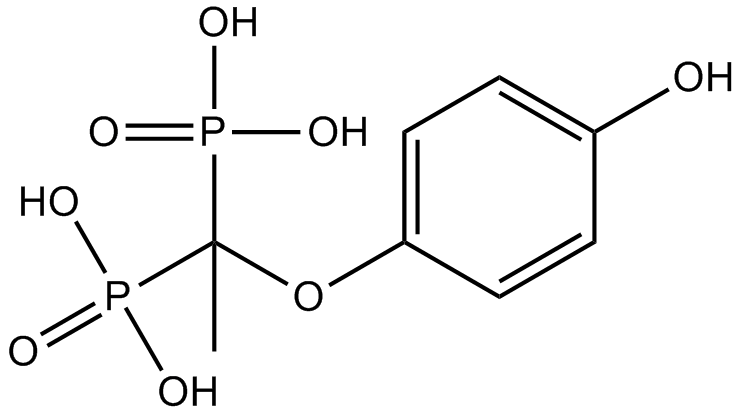L-690,330 |
| Catalog No.GC16451 |
competitive inhibitor of inositol monophosphatase (IMPase)
Products are for research use only. Not for human use. We do not sell to patients.

Cas No.: 142523-38-4
Sample solution is provided at 25 µL, 10mM.
L-690,330 is a competitive inhibitor of inositol monophosphatase (IMPase) with a Ki value of between 0.2 and 2 μM depending on the source of IMPase [1].
In the phosphatidylinositol (PI) cycle cell signalling pathway, IMPase is involved as a key enzyme. Inositol monophosphates, inositol(1)phosphate [Ins(l)P], inositol(3)phosphate [Ins(3)P], and inositol(4)phosphate [Ins(4)P] are hydrolyzed by IMPase and produce free inositol. Free inositol can then be used to synthesize PI [1].
In carbachol-stimulated m1 CHO cells, the treatment with L-690,330 alone did not increase the amount of [3H]InsP1. In the absence of L-690,330, the treatment with carbachol alone increased levels of [3H]InsP1, resulted in levels ranging from 20 to 100% above basal [3H]InsP1 levels. In the presence of carbachol, lithium at 10 mM increased the amount of [3H]InsP1 by approximate five folds (relative to [3H]InsP1 levels in carbachol-stimulated cells) and the EC50 value of this effect was about 1 mM. In carbachol-stimulated cells, L-690,330 at 10 mM resulted in only ~40% of the maximum response seen in the case with lithium treatment [1].
In mouse brains, in the absence of L-690,330, pilocarpine produced approximately doubled levels of Ins(1)P. In the absence of pilocarpine, L-690,330 did not affect Ins(1)P levels. Under pilocarpine-stimulated conditions, treatment with L-690,330 resulted in a pronounced accumulation of Ins(1)P, with the maximum level observed 1 h after injection. The maximum was of an approximate four-fold elevation [1].
Reference:
[1]. Atack JR, Cook SM, Watt AP, et al. In Vitro and In Vivo Inhibition of Inositol Monophosphatase by the Bisphosphonate L-690,330. Journal of neurochemistry, 1993, 60(2): 652-658.
Average Rating: 5 (Based on Reviews and 39 reference(s) in Google Scholar.)
GLPBIO products are for RESEARCH USE ONLY. Please make sure your review or question is research based.
Required fields are marked with *




















